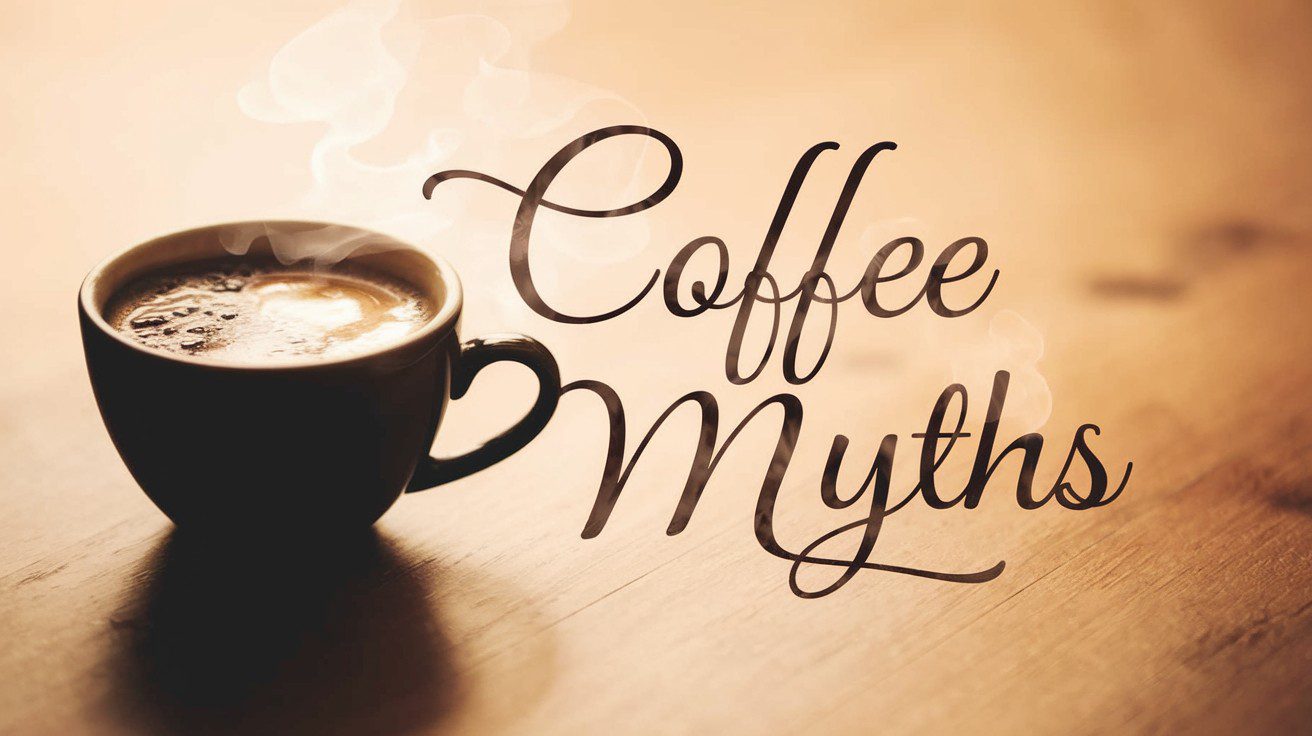 Animal
Animal
 Celebration
Celebration
 Funny
Funny
 Holiday
Holiday
Most Popular
-
 Happy 4th of July Fun Coffee Mug
$21.99 – $22.99
Happy 4th of July Fun Coffee Mug
$21.99 – $22.99
-
 We’re the Perfect Blend Valentines Day Coffee Mug
$21.99 – $22.99
We’re the Perfect Blend Valentines Day Coffee Mug
$21.99 – $22.99
-
 You’re My Cup of Tea (or Coffee) Mug
$21.99 – $22.99
You’re My Cup of Tea (or Coffee) Mug
$21.99 – $22.99
-
 Oh, Canada and Coffee! Mug & Tea Cup
$21.99 – $22.99
Oh, Canada and Coffee! Mug & Tea Cup
$21.99 – $22.99

-
 Location
Location
 People
People
 Sports
Sports
 Wedding
Wedding
 Other
Other
Top 10 Coffee Myths Debunked: Separating Fact from Fiction

Coffee is one of the most beloved beverages in the world, enjoyed by millions daily for its rich flavor, energizing effects, and social appeal. Yet, despite its popularity, coffee is surrounded by a plethora of myths and misconceptions. From claims that it stunts growth to the belief that dark roast coffee packs more caffeine, these myths have persisted for decades, often leading to confusion among coffee enthusiasts. In this article, we’ll dive into the most common coffee myths, separate fact from fiction, and uncover the truth about this iconic drink.
Myth 1: Coffee Stunts Your Growth
One of the most enduring myths about coffee is that it stunts growth, particularly in children and teenagers. This belief has been passed down through generations, often discouraging young people from enjoying coffee. But is there any truth to it?
The Truth:
There is no scientific evidence to support the claim that coffee stunts growth. The myth likely originated from the idea that caffeine, a key component of coffee, can interfere with calcium absorption, potentially affecting bone development. However, studies have shown that the impact of caffeine on calcium absorption is minimal, especially when consumed in moderation. In fact, the amount of calcium lost from drinking a cup of coffee can be offset by adding just a tablespoon of milk.
The real concern with children and teenagers consuming coffee is its caffeine content, which can lead to side effects like jitteriness, increased heart rate, and sleep disturbances. For this reason, health experts recommend limiting caffeine intake for younger individuals, but growth stunting is not a legitimate concern.
Myth 2: Dark Roast Coffee Has More Caffeine
Many coffee drinkers believe that dark roast coffee contains more caffeine than light roast. This assumption is often based on the stronger, bolder flavor of dark roasts, which can make them seem more potent.
The Truth:
Contrary to popular belief, dark roast coffee actually has slightly *less* caffeine than light roast. The roasting process reduces the caffeine content of coffee beans, meaning that the longer beans are roasted (as in dark roasts), the more caffeine is burned off. Light roasts, which are roasted for a shorter time, retain more of their original caffeine content.
However, the difference in caffeine content between light and dark roasts is relatively small. What matters more is how the coffee is measured. If you measure by volume (e.g., using a scoop), dark roast beans are less dense, so you’ll end up with fewer beans—and therefore less caffeine—per scoop. If you measure by weight, the difference becomes negligible. Ultimately, the caffeine content of your cup of coffee depends more on the brewing method and the amount of coffee used than on the roast level.
Myth 3: Coffee Dehydrates You
Another common myth is that coffee dehydrates the body due to its diuretic effect. This has led some people to avoid coffee, especially when they’re trying to stay hydrated.
The Truth:
While caffeine is a mild diuretic, meaning it can increase urine production, the amount of water in a cup of coffee more than compensates for this effect. Studies have shown that moderate coffee consumption (about 3-4 cups per day) does not lead to dehydration. In fact, coffee can contribute to your daily fluid intake just like water or tea.
That said, excessive caffeine consumption can have a stronger diuretic effect, so it’s important to balance your coffee intake with plenty of water, especially in hot weather or during physical activity. For most people, however, coffee is not a dehydrating beverage.
Myth 4: Coffee Is Bad for Your Heart
For years, coffee has been blamed for causing heart problems, including high blood pressure, irregular heartbeats, and even heart attacks. This has led many to believe that coffee is inherently harmful to cardiovascular health.
The Truth:
Recent research has largely debunked this myth. In fact, moderate coffee consumption has been associated with several cardiovascular benefits. Studies have shown that drinking 3-5 cups of coffee per day may reduce the risk of heart disease, stroke, and heart failure. Coffee is rich in antioxidants, which can help reduce inflammation and improve blood vessel function.
While caffeine can cause a temporary increase in blood pressure, this effect is usually mild and tends to diminish with regular consumption. For most people, coffee does not pose a significant risk to heart health. However, individuals with certain heart conditions or caffeine sensitivities should consult their doctor before consuming coffee.
Myth 5: Decaf Coffee Is Caffeine-Free
Many people turn to decaf coffee to avoid the effects of caffeine, believing that it contains no caffeine at all. This makes it a popular choice for those who are sensitive to caffeine or want to enjoy coffee later in the day without disrupting their sleep.
The Truth:
Decaf coffee is not completely caffeine-free. While the decaffeination process removes most of the caffeine, trace amounts still remain. On average, an 8-ounce cup of decaf coffee contains about 2-5 milligrams of caffeine, compared to 95 milligrams in a regular cup of coffee. While this amount is small, it can still affect individuals who are highly sensitive to caffeine.
If you’re trying to eliminate caffeine entirely, it’s important to be aware that decaf coffee may not be the best option. Instead, consider caffeine-free alternatives like herbal teas or chicory coffee.
Myth 6: Coffee Causes Insomnia
It’s no secret that caffeine is a stimulant, and many people avoid coffee in the afternoon or evening out of fear that it will keep them awake at night.
The Truth:
While caffeine can interfere with sleep, its effects vary from person to person. Factors such as individual tolerance, metabolism, and the timing of consumption all play a role. For most people, consuming caffeine 6-8 hours before bedtime is unlikely to disrupt sleep. However, those who are more sensitive to caffeine may need to cut off their coffee intake earlier in the day.
If you’re concerned about coffee affecting your sleep, try limiting your consumption to the morning or early afternoon. Additionally, opting for decaf or half-caf options later in the day can help you enjoy coffee without compromising your rest.
Myth 7: Coffee Is Addictive
The idea that coffee is addictive is a common concern, with many people believing that regular consumption leads to dependency and withdrawal symptoms.
The Truth:
While caffeine is a stimulant that can lead to mild physical dependence, it is not addictive in the same way that drugs or alcohol are. Regular coffee drinkers may experience withdrawal symptoms like headaches, fatigue, and irritability if they suddenly stop consuming caffeine, but these symptoms are typically mild and short-lived.
Most people can enjoy coffee in moderation without developing a dependency. If you’re worried about caffeine dependence, consider gradually reducing your intake rather than quitting cold turkey.
Myth 8: Coffee Is Unhealthy
Coffee has often been labeled as an unhealthy beverage, blamed for everything from causing cancer to increasing stress levels. This negative reputation has led some to avoid coffee altogether.
The Truth:
When consumed in moderation, coffee is not only safe but can also offer several health benefits. Coffee is packed with antioxidants, which help protect the body against oxidative stress and inflammation. Studies have linked moderate coffee consumption to a reduced risk of several chronic conditions, including type 2 diabetes, Parkinson’s disease, Alzheimer’s disease, and certain types of cancer.
Of course, the health effects of coffee can vary depending on how it’s prepared. Adding excessive sugar, cream, or flavored syrups can turn a healthy cup of coffee into a calorie-laden treat. To maximize the health benefits, opt for black coffee or use minimal additives.
Myth 9: Espresso Has More Caffeine Than Drip Coffee
Many people assume that espresso, with its strong flavor and concentrated form, contains more caffeine than regular drip coffee.
The Truth:
While espresso has a higher concentration of caffeine per ounce, a standard shot of espresso (about 1 ounce) contains around 63 milligrams of caffeine, compared to 95 milligrams in an 8-ounce cup of drip coffee. This means that, ounce for ounce, espresso has more caffeine, but a typical serving of drip coffee delivers more caffeine overall.
The difference in caffeine content largely depends on the serving size and brewing method. If you’re looking for a stronger caffeine boost, drip coffee is generally the better choice.
Myth 10: Coffee Sobers You Up
A popular belief is that drinking coffee can help sober you up after consuming alcohol. This myth has led many to rely on coffee as a quick fix for alcohol-induced impairment.
The Truth:
Coffee does not reduce blood alcohol levels or speed up the metabolism of alcohol. While caffeine can make you feel more alert, it does not counteract the effects of alcohol on your coordination, judgment, or reaction time. In fact, combining alcohol and caffeine can be dangerous, as it may lead to a false sense of sobriety, increasing the risk of risky behaviors like drunk driving.
The only way to sober up is to give your body time to metabolize the alcohol. Drinking water and eating food can help, but coffee is not a solution.
Conclusion
Coffee is a complex and fascinating beverage that has been the subject of countless myths and misconceptions. While some of these myths contain a kernel of truth, many are entirely unfounded. By separating fact from fiction, we can better appreciate coffee for what it truly is: a delicious, energizing, and healthful drink that can be enjoyed in moderation as part of a balanced lifestyle.
So, the next time you hear someone claim that coffee stunts growth or that dark roast has more caffeine, you’ll be armed with the knowledge to set the record straight. Cheers to enjoying your coffee with confidence!


 Animal
Animal Celebration
Celebration Funny
Funny Holiday
Holiday Christmas Mugs
Christmas Mugs  Festive Mugs
Festive Mugs  Fourth of July Mugs
Fourth of July Mugs  Halloween Mugs
Halloween Mugs  Thanksgiving Mugs
Thanksgiving Mugs  Valentines Mugs
Valentines Mugs 




 Location
Location People
People Sports
Sports Wedding
Wedding Other
Other Bee Mugs
Bee Mugs Bird Mugs
Bird Mugs Bunny Mugs
Bunny Mugs Cat Mugs
Cat Mugs Goat Mugs
Goat Mugs Horse Mugs
Horse Mugs Lion Mugs
Lion Mugs Monkey Mugs
Monkey Mugs Moose Mugs
Moose Mugs Owl Mugs
Owl Mugs Sheep Mugs
Sheep Mugs Snail Mugs
Snail Mugs Turtle Mugs
Turtle Mugs Unicorn Mugs
Unicorn Mugs Engagement Mugs
Engagement Mugs Retirement Mugs
Retirement Mugs St Patrick’s Day Mugs
St Patrick’s Day Mugs Thank You Mugs
Thank You Mugs Boss Mugs
Boss Mugs Christmas Mugs
Christmas Mugs Colleague Mugs
Colleague Mugs Dad Mugs
Dad Mugs Grandad Mugs
Grandad Mugs Grandma Mugs
Grandma Mugs Husband Mugs
Husband Mugs Lawyer Mugs
Lawyer Mugs Nurse Mugs
Nurse Mugs Sarcastic Mugs
Sarcastic Mugs Uncle Mugs
Uncle Mugs Wife Mugs
Wife Mugs Fourth of July Mugs
Fourth of July Mugs Halloween Mugs
Halloween Mugs Thanksgiving Mugs
Thanksgiving Mugs Valentines Day Mugs
Valentines Day Mugs Amsterdam Mugs
Amsterdam Mugs Barcelona Mugs
Barcelona Mugs Berlin Mugs
Berlin Mugs Chicago Mugs
Chicago Mugs Dubai Mugs
Dubai Mugs London Mugs
London Mugs Paris Mugs
Paris Mugs Rome Mugs
Rome Mugs Sydney Mugs
Sydney Mugs Tokyo Mugs
Tokyo Mugs Toronto Mugs
Toronto Mugs Aunt Mugs
Aunt Mugs Boss Mugs
Boss Mugs Boyfriend Mugs
Boyfriend Mugs Co-Worker Mugs
Co-Worker Mugs Couples Mugs
Couples Mugs Gamer Mugs
Gamer Mugs Girlfriend Mugs
Girlfriend Mugs Nanny Mugs
Nanny Mugs Sister Mugs
Sister Mugs Teachers Mug
Teachers Mug Baseball Mugs
Baseball Mugs Fishing Mugs
Fishing Mugs Football Mugs
Football Mugs Golf Mugs
Golf Mugs Rugby Mugs
Rugby Mugs Soccer Mugs
Soccer Mugs Tennis Mugs
Tennis Mugs Best Man Mugs
Best Man Mugs Bridesmaids Mugs
Bridesmaids Mugs Father of the Bride Mugs
Father of the Bride Mugs Groomsmen Mugs
Groomsmen Mugs Matron of Honor Mugs
Matron of Honor Mugs Inspirational Mugs
Inspirational Mugs Offensive Mugs
Offensive Mugs Sexy Mugs
Sexy Mugs